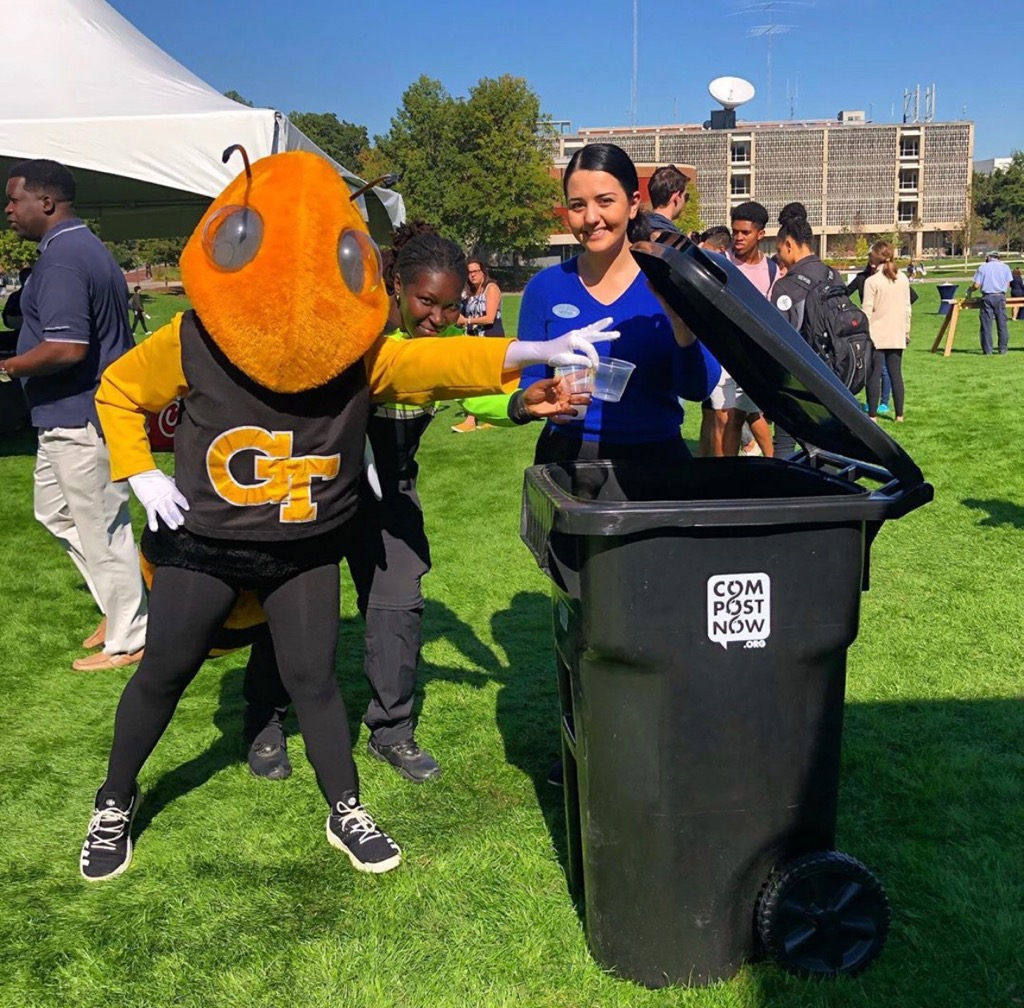
The best way to fight food waste is to prevent it from happening in the first place.
At Georgia Tech Dining, we are continuously building upon our sustainability programs as we strive to minimize our environmental impact, strengthen our local and global community, and consistently provide food offerings that are healthy, sustainable, and delicious.
Why Waste?
Each year, approximately 130 billion pounds of food are discarded in the United States, including an estimated 22 billion pounds from U.S. Colleges and Universities. With nearly 50 million Americans regularly experiencing food insecurity, we understand we have both an environmental and social responsibility to fight food waste on a daily basis as we serve the Georgia Tech community.
Fighting Food Waste
We believe that the best way to fight food waste is to prevent it from happening in the first place. Following the guidance of the EPA Food Recovery Hierarchy, we begin with source reduction, minimizing our operational food waste through careful preparation, creative product utilization, and menu forecasting. We also empower students and guests to join us in our efforts to fight food waste through sustainability tabling and events like “Weigh the Waste.”
“Weigh the Waste” allows us to track the average volume of food wasted per meal while identifying ways to improve our guest’s dining experience and collecting real-time feedback on why waste is occurring in the first place. These events also allow us to engage directly with the Georgia Tech community and share easy starting points for anyone interested in minimizing their own food waste percentage.
Looking to take the first step in fighting food waste when dining on campus?
Here are a few ways to get started:
- When dining at Brittain and North Avenue Dining Halls, try starting with smaller portions or sampling new offerings before filling up your plate. Both locations are all-you-care-to-eat facilities and you can always come back for more!
- Hydration matters! When we are dehydrated, our body sends signals that we’re hungry, when we really need something to drink. Try drinking a glass of water with or before your meal, you might not be as hungry as you think.
- Join our To-Go box program at North Avenue or Brittain, or ask for your meal to go at West Village! You can eat whenever you’re ready and store any leftovers in the fridge for the next time you’re hungry.
Increasing Food Access
When we do have excess food, we prioritize the donation of safe and ready-to-eat food items through our bi-weekly donation program at Brittain Dining Hall. We work closely with Georgia Tech Campus Kitchen, a student-led volunteer initiative that packages and delivers donations from GT Dining to Klemis Kitchen, Georgia Tech’s on-campus resource and food pantry for students that are currently experiencing food insecurity. Through the combined efforts of GT Campus Kitchen and the GT Dining Operations team, we were able to donate over 2,000 meals to Klemis Kitchen in fall 2019.
Campus Composting
While our fight against food waste starts with prevention and donation, we understand that some food waste is unavoidable. On September 23, 2019, GT Dining launched a campus-wide composting program with Compost Now that resulted in over 129,000 pounds of compostables and food waste being diverted from landfills by December 2019.
Once the composting process is complete, all finished compost is donated throughout the metro Atlanta community to school gardens, small farms, nonprofits, and community gardens, with 200 pounds of compost available for use at Georgia Tech each year. Our fall compostable collections will amount to roughly 13,000 pounds of finished compost that will be returned to enrich the soil throughout our community. We look forward to supporting campus garden projects like the Kendeda Living Building’s rooftop garden and the Georgia Tech Community Garden as we strive to “close the loop” of our composting program and support the collaborative success of Institutional sustainability efforts.
What’s New on the Menu?
GT Dining kicked off the spring semester with an expanded hot-foods menu at “Umami Shoppe” in West Village and the opening of “Republic of Spice”, a new concept featuring Indian cuisine that is located on the first floor of the Student Center. Whether you are enjoying a Butter Chicken Rice Bowl from the Student Center or warming up with a steaming bowl of freshly prepared Ramen in West village, both concepts feature a range of compostable vessels that allow guests to dine in or take their meal to go, all while minimizing the environmental impact of single-use disposables.
Interested in learning more about these or other GT Dining Sustainability Programs? We’d love to connect!